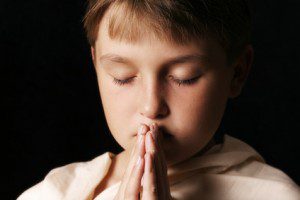Nicholas C. DiDonato
Everyone knows that memories can fade with time. But not everyone realizes that in “refreshing” memories by remembering them, they risk distortion. This has implications for how people construct their identity. Focusing on religious identity, psychologists R. David Hayward (University of Michigan), Joanna Maselko (Duke University Medical Center), and Keith G. Meador (Vanderbilt University Medical Center) found that people would accurately remember their childhood religious behavior but would alter their childhood religious identity so that it matched their present religious identity.
Most people seek to maintain a consistent self-identity over time. More specifically, according to self-appraisal theory, people see their “present self” as part of a coherent and consistent series of selves that extends forwards and backwards in time. When faced with a past self that does not fit with the present picture, people will rework it so that it will.
With self-appraisal theory in mind, the researchers note that religious identity tends to follow a distinct pattern: religiosity starts off relatively high until adolescence, where it drops sharply, but then it increases again in middle adulthood and continues until death. This topsy-turvy pattern of the typical person’s religiosity obviously does not lend itself to stable self-identity.
Further complicating matters, in certain instances people will desire to detach their “former” self from their current self. In religious terms, this could be a conversion experience where the convert sees himself or herself as living a radically different life (and is proud of this contrast). In more secular terms, a study has shown that college students tend to evaluate themselves more positively in comparison with earlier in the semester, even though the metrics detected no evidence of actual improvement.
Recognizing all of these nuances, the psychologists hypothesize that self-reported subjective measures of religious identity will change over time more so than self-reported objective measures. They believe that the construction of a personal identity can more easily assimilate subjective data than objective data.
To test their hypothesis, they used data from the Providence, Rhode Island, birth-cohort of the National Collaborative Perinatal Project (NCPP), and its three follow-up studies. From 1959 to 1961, the NCPP received 4,140 positive responses from mothers who would volunteer their then-infant children to participate in this survey. The first followup study took place between 1987 and 1991, the second in 1996, and the third in 2001. The relevant measures of religious identity for the current study include: (1) “Do you regularly go to a church or other place of worship?”, (2) “Do you consider yourself a religious person?”, (3) “Growing up, did you regularly go to a church or other place of worship?”, and (4) “Growing up, did you consider yourself a religious person?” Asking about church attendance qualifies as an objective measure, while asking about being a “religious person” qualifies as a subjective measure.
As expected, reports of childhood religious behavior (going to church) changed less than reports of childhood religious identity: 11.4% altered the former while 25.9% altered the latter. These alterations in most cases tended in the direction of conformity with current adult identity. Consequently, currently religious people recollected their childhood self as also being religious, and, likewise, currently non-religious people did the opposite. The objective measure of church attendance did not enjoy complete immunity from adult reconstructions of their past, but such reconstructions did require more effort to explain away the fact of their childhood church attendance. Religious people who did not attend church frequently as a child answered by saying that their parents did not give them the opportunity to realize their true identity, and non-religious people who did attend church frequently as a child answered by saying that they conformed to their parents’ church-going behavior because of family pressure.
The researchers fully admit some of the limitations of their research. First, the NCPP asked only if the person attended church “regularly,” with the only responses being Yes or No. “Regularly” is ill-defined and subject to a wide range of interpretations. Second, the same criticism applies to the words “child” and “growing up”—these undefined terms could mean different age ranges to different people (is a teenager or someone in their early 20s still “growing up?”). Finally, the NCPP sought participants only in the heavily Protestant country of the United States (and only in one American city), so these results may not apply outside of this context.
Still, at the very least, this research does issue a warning to all studies of religion that rely solely on participants’ recollections of their childhood religious identities. Such studies risk accepting distorted or even false data. But if they do let false data slip in, they can always, after the fact, retell their story.
For more, see “Recollections of childhood religious identity and behavior as a function of adult religiousness” in the International Journal for the Psychology of Religion.












